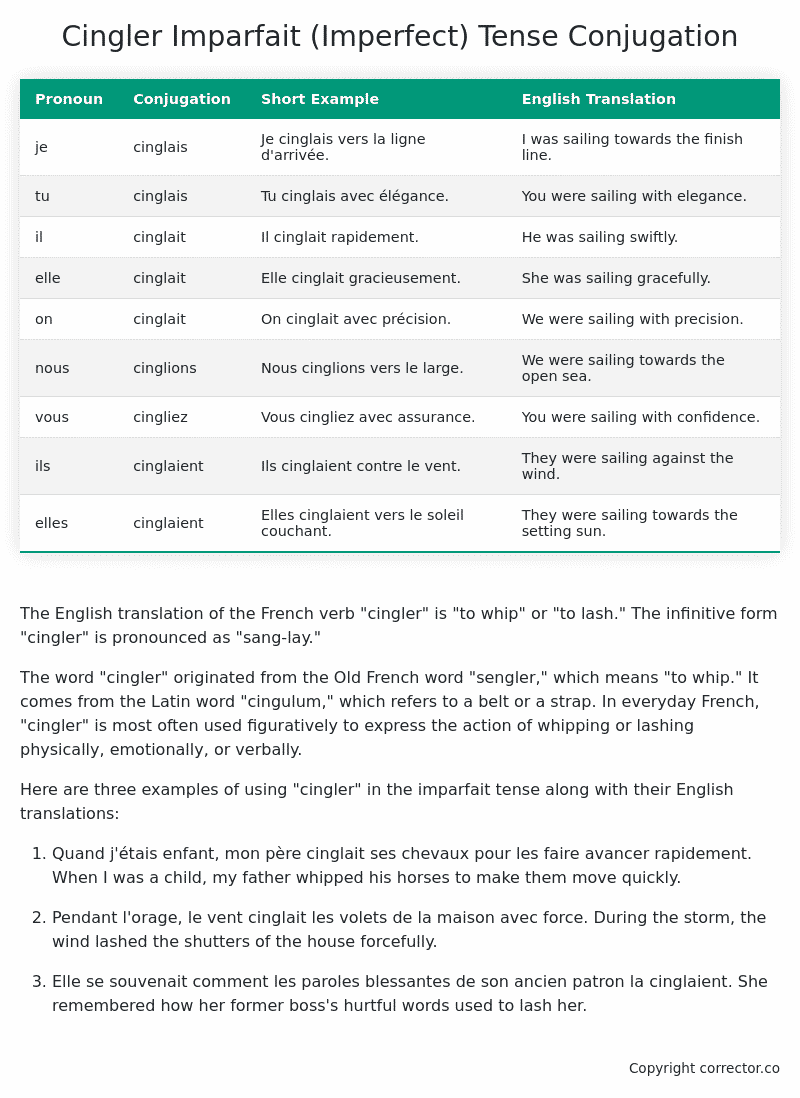Imparfait (Imperfect) Tense Conjugation of the French Verb cingler
Introduction to the verb cingler
The English translation of the French verb “cingler” is “to whip” or “to lash.” The infinitive form “cingler” is pronounced as “sang-lay.”
The word “cingler” originated from the Old French word “sengler,” which means “to whip.” It comes from the Latin word “cingulum,” which refers to a belt or a strap. In everyday French, “cingler” is most often used figuratively to express the action of whipping or lashing physically, emotionally, or verbally.
Here are three examples of using “cingler” in the imparfait tense along with their English translations:
-
Quand j’étais enfant, mon père cinglait ses chevaux pour les faire avancer rapidement.
When I was a child, my father whipped his horses to make them move quickly. -
Pendant l’orage, le vent cinglait les volets de la maison avec force.
During the storm, the wind lashed the shutters of the house forcefully. -
Elle se souvenait comment les paroles blessantes de son ancien patron la cinglaient.
She remembered how her former boss’s hurtful words used to lash her.
Table of the Imparfait (Imperfect) Tense Conjugation of cingler
| Pronoun | Conjugation | Short Example | English Translation |
|---|---|---|---|
| je | cinglais | Je cinglais vers la ligne d’arrivée. | I was sailing towards the finish line. |
| tu | cinglais | Tu cinglais avec élégance. | You were sailing with elegance. |
| il | cinglait | Il cinglait rapidement. | He was sailing swiftly. |
| elle | cinglait | Elle cinglait gracieusement. | She was sailing gracefully. |
| on | cinglait | On cinglait avec précision. | We were sailing with precision. |
| nous | cinglions | Nous cinglions vers le large. | We were sailing towards the open sea. |
| vous | cingliez | Vous cingliez avec assurance. | You were sailing with confidence. |
| ils | cinglaient | Ils cinglaient contre le vent. | They were sailing against the wind. |
| elles | cinglaient | Elles cinglaient vers le soleil couchant. | They were sailing towards the setting sun. |
Other Conjugations for Cingler.
Le Present (Present Tense) Conjugation of the French Verb cingler
Imparfait (Imperfect) Tense Conjugation of the French Verb cingler (You’re reading it right now!)
Passé Simple (Simple Past) Tense Conjugation of the French Verb cingler
Passé Composé (Present Perfect) Tense Conjugation of the French Verb cingler
Futur Simple (Simple Future) Tense Conjugation of the French Verb cingler
Futur Proche (Near Future) Tense Conjugation of the French Verb cingler
Plus-que-parfait (Pluperfect) Tense Conjugation of the French Verb cingler
Passé Antérieur (Past Anterior) Tense Conjugation of the French Verb cingler
Futur Antérieur (Future Anterior) Tense Conjugation of the French Verb cingler
Subjonctif Présent (Subjunctive Present) Tense Conjugation of the French Verb cingler
Subjonctif Passé (Subjunctive Past) Tense Conjugation of the French Verb cingler
Subjonctif Imparfait (Subjunctive Imperfect) Tense Conjugation of the French Verb cingler
Subjonctif Plus-que-parfait (Subjunctive Pluperfect) Tense Conjugation of the French Verb cingler
Conditionnel Présent (Conditional Present) Tense Conjugation of the French Verb cingler
Conditionnel Passé (Conditional Past) Tense Conjugation of the French Verb cingler
Conditionnel Passé II (Conditional Past II) Tense Conjugation of the French Verb cingler
L’impératif Présent (Imperative Present) Tense Conjugation of the French Verb cingler
L’impératif Passé (Imperative Past) Tense Conjugation of the French Verb cingler
L’infinitif Présent (Infinitive Present) Tense Conjugation of the French Verb cingler
L’infinitif Passé (Infinitive Past) Tense Conjugation of the French Verb cingler
Le Participe Présent (Present Participle) Tense Conjugation of the French Verb cingler
Le Participe Passé (Past Participle) Tense Conjugation of the French Verb cingler
Struggling with French verbs or the language in general? Why not use our free French Grammar Checker – no registration required!
Get a FREE Download Study Sheet of this Conjugation 🔥
Simply right click the image below, click “save image” and get your free reference for the cingler imparfait tense conjugation!

Cingler – About the French Imparfait Tense
NOTE: To take a deep dive into all the French tenses then see our article on Mastering French Tense Conjugation.
Formation of the Imparfait Tense
For regular -er verbs:
For regular -ir verbs
For regular -re verbs
Common Everyday Usage Patterns
Description of Past Habits
Background Information
Mental and Emotional States
It’s employed to express emotions, thoughts, or physical sensations in the past. For example: “J’étais content quand il est arrivé.” (I was happy when he arrived.)
Ongoing Actions
Points to Note About the Imparfait Tense
Passé Composé vs. Imparfait
Conditional
Si Clauses
Narration
I hope you enjoyed this article on the verb cingler. Still in a learning mood? Check out another TOTALLY random French verb imparfait conjugation!


